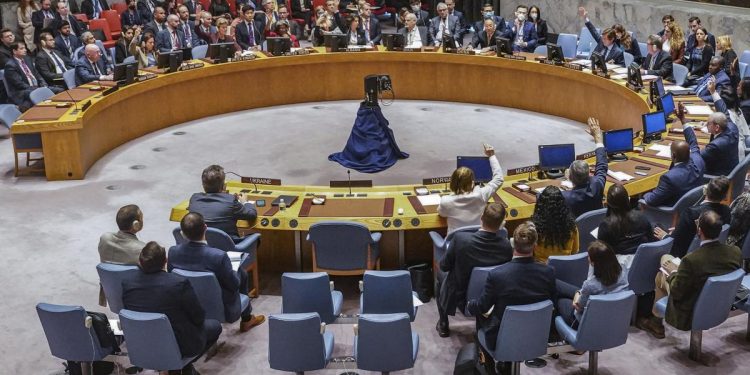It was a foregone conclusion that Russia would veto a United Nations Security Council (UNSC) resolution September 30 that sought to condemn its referendums in four Ukrainian regions of Luhansk, Donetsk, Kherson and Zaporizhzhia as illegal. The resolution further desired to declare them invalid and urge all countries not to recognise any annexation of those territories by Moscow. This was despite 10 votes out of 15 going in favour of the resolution and 1 against with four countries – China, India, Brazil and Gabon – abstaining.
The resolution, if passed, would also have demanded an immediate halt to Russia’s “full-scale unlawful invasion of Ukraine” and the immediate and unconditional withdrawal of all its military forces from that country. The veto and defeat of the resolution was rather a commonplace event as countries holding veto powers had exercised this option umpteenth times in the past in keeping with their respective geopolitical agenda. It was only natural that Russia would also follow this beaten track and veto the resolution intended to declare it as an international pariah.
What, however, has caused a diplomatic stir is India’s decision to abstain only days after Prime Minister Narendra Modi had formulated a position that India would not countenance war and advocate peace. Modi had recently stated that this was not the era of war. The two different stances are self-contradictory and by hindsight it appears there was no need for raising false expectations in the West about India returning to its age old policy of non alignment and not siding with Russia at the UN forum.
Britain’s ambassador to the UN, Barbara Woodward, explained the position of 10 countries in favour of the resolution by saying that Russia’s actions violated the UN Charter. The area Russia is claiming to have annexed is more than 90,000 square kilometres which is being described as the largest forcible annexation of territory since the Second World War. This, of course, may be debatable if China’s forcible occupation of Indian territory during the last three years is taken into account.
There is not much doubt, despite Russia’s claims to the contrary, that the referendums on whether the regions wanted to join Russia were “pre-determined” in Moscow. These were engineered at a time when Russia was finding it difficult to vanquish Ukraine.
Russian Ambassador Vassily Nebenzia’s claim at the UNSC that the results of the referendums reflected the refusal of the residents of the four regions to return to Ukraine sounds ludicrous. His accusation that the Western nations on UNSC had betrayed their “open” hostility by putting forward a resolution condemning a council member is predictable enough.
What China’s Ambassador to the UN Zhang Jun said to justify his country’s abstention has at least a veneer of logic. He said the sovereignty and territorial integrity of all countries should be safeguarded, but the UNSC should try to calm the crisis “rather than intensifying conflicts and exacerbating confrontation.”
Likewise, Brazil’s Ambassador, asserted the referendums “cannot be perceived as legitimate,” but his country abstained because the resolution was not for de-escalating tensions and finding “a solution for the conflict in Ukraine.”
Without spelling out the reason for its abstention, Gabon’s representative said that his country supported the UN Charter, was against war and called for a diplomatic solution to the conflict.
But, Indian diplomacy cut a sorry figure by its explanation for abstention. It was the least convincing. What India’s permanent representative to the United Nations (UNPR) Ruchira Kamboj, said was neither here nor there. She said India was “deeply disturbed” by the recent events in Ukraine and “always advocated” there could be no solution at the cost of human lives. She iterated the Prime Minister’s earlier message that it is “not an era for war.”
This is wishy-washy. India had hoped for getting cheaper crude oil from Russia benefiting from the West’s sanctions since the invasion of Ukraine but that situation seems to have changed lately. Besides, Russia is its most important military hardware supplier and benefactor. As such it is in no position to act openly against Russia. In such a situation it is undiplomatic and foolhardy to have created a false impression that India might deviate from its former foreign policy vis-a-vis Russia.
Sticking to the truth might always seem to be a good idea. Even in complex foreign policy. India today is being viewed as a bumbling nation with no clear idea of where it wants to place itself.







































